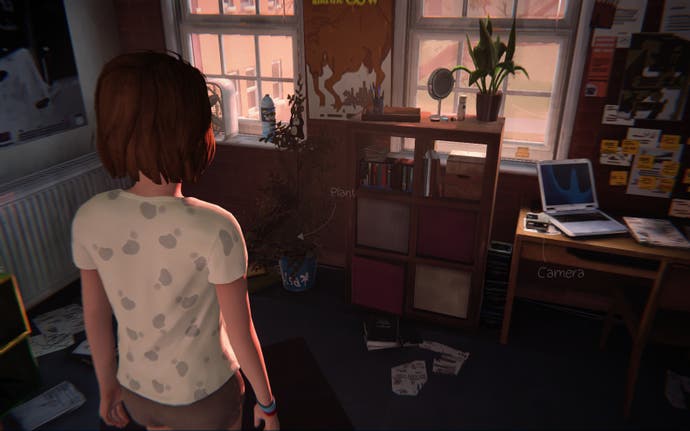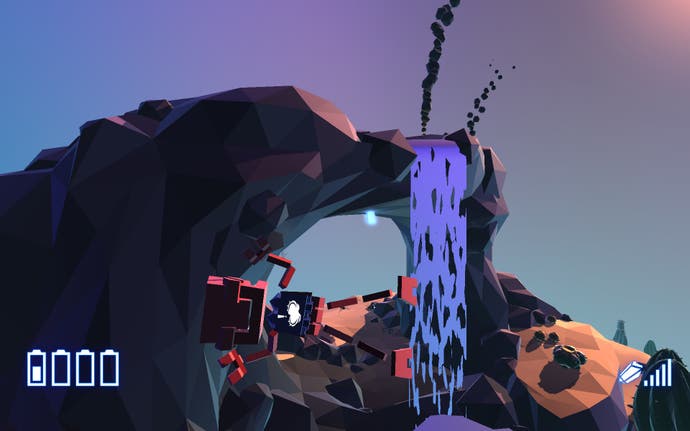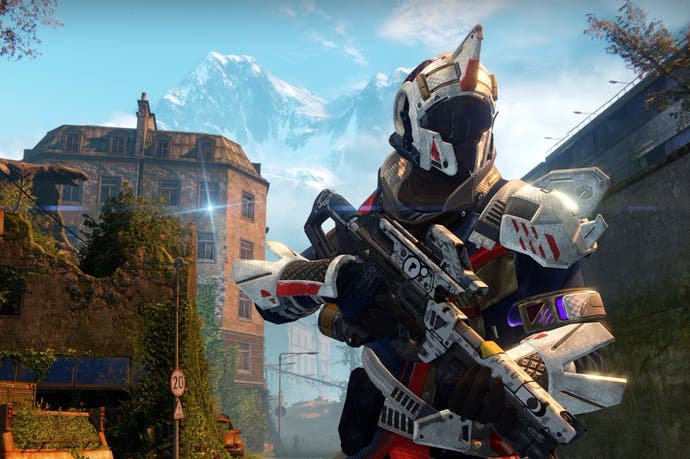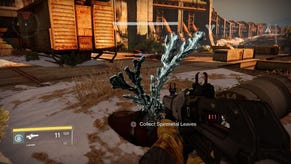How games often live in memory
Engrams!
Destiny 2 is here! Have you noticed? Oh, I have so many memories of the first one: those huge Romantic skyboxes, that tangle of rusted cars, piled high against a patchwork wall, the roar of the shotgun, the endless hunt for Xur and his bargains.
It should probably feel strange that I have so many memories of Destiny, because I never actually played it. Still, I lived around it for months and months, glimpsing the UI over people's shoulders in the office as I passed or watching the game idle on a distant TV across the room. Over time, the things I heard about - all that chatter about Engrams - became muddled up with the things I had witnessed without understanding them, and pretty soon the whole thing cohered into what I have now: hundreds of images of what Destiny is, and what it looks like, all working together to create a sense of what you do in Destiny, of what the game values, and what it wants you to value.
The strange thing, then, is that if I had played Destiny, I probably wouldn't have this many memories of it. Or rather, I wouldn't have this many memories floating easily within reach. I'd probably have to dig for them, for the specifics. This is the weird thing I have noticed over the last few years. It's something to do with the way games work in my memory - and maybe, hopefully, in your memory too. As time passes, even the most vivid game is reduced to a single moment, a single feeling, a single incident. Other, more detailed memories are still there waiting, but I have to work my way back to them. And that takes a bit of effort.
I could ponder why this is. I could think of 'place lag', which I read about in Mark Vanhoenacker's book Skyfaring. Vanhoenacker is a pilot for British Airways. A weird thought, that your 747 may be in the hands of a poet. He talks about the strange sensation we all have when flying: that we travel too far, too quickly, and the brain struggles to make sense of all the stuff we are witnessing, as carelessly flung together as it is. Vanhoenacker sums it up beautifully when he describes place lag as, "the inability of our deep old sense of place to keep up with our aeroplanes." Maybe that deep old sense of place can't handle games either, so it squashes them down to a few images, a few sights, to protect us from the headrush of all the terrifying, beautiful worlds we have sort of been to.
I think there is something to that. My memory of games has certainly changed the more I play of them. What fascinates me at the moment is how I can't really get to choose which part of a game I remember most clearly - which memory ends up as the keystone, as it were. Life is Strange, the first one, had a handful of moments I thought were really special: the girl on the roof (I can't remember her name, of course), the bit about breaking into the principal's office (I can't remember why, and whether it even was the principal's office or someone else on staff), and my favourite piece of visual storytelling ever, Chloe Price's half-painted house: her Miss Havisham House. (I can remember, with a bit of effort, why the painting was so suddenly curtailed.) But anyway, the memory I return to when someone mentions Life is Strange to me, the keystone memory behind which all the others lurk? That's something else entirely: Max in her dorm room early one morning, waking up as a laptop screensaver warps and flexes colour across its screen. A hand reaches out from the bed and grabs a phone and checks messages.

Nothing is happening in this scene - nothing major, at least - and yet what I'm remembering is the mood of the game, a game that reminded me of what it was like to be a student and relatively footloose, but also mired in a world of complex social anxieties. What the mornings felt like in such a busy, but shiftless period of my life: they felt like precious periods of calm amongst the endless rush. My memory of Life is Strange, then, or rather, the way that Life is Strange lives in my mind, is this bright emblematic instance, something I have unconsciously chosen to stand in for the rest of the game - chosen, I guess, because it gets at all the secret things that the game does so well, and that speak to me most directly.
So many games seem to be stored like this. Grow Up, which I love, is a single bright second of flight, arcing in on a gust of wind to the floating arch of a waterfall, behind which a collectable gem, chunky and smooth as a tooth, waits for me to pluck it from the earth. I can't even remember if this moment actually exists as I see it in my mind, but it captures so many of the kinds of delight that Grow Up contains: the delight in fast movement, in exploration, in seeing remarkable things up in the clouds. But also the delight in secrets, in collectables, and in knowing that the gem would be there, because by now I had come to understand how the designers think, and how they like to hide things. So that arcing flight is also the delight of hard-won mastery, of a meeting of minds.
I could go on. Half-Life 2 is that bit in an alleyway of City 17 when you see Combine architecture grinding forward and you realise it is slowly eating a human street: metal spars, smooth and black advancing, a foe that outmatches us in every way, and yet is so bleak and uncaring that it must be fought regardless. Billy Hatcher is a boss-fight in waving grass against a baddie that rushes back and forth: pure sensation, a memory of being overwhelmed by the joy and colour and vividness of what I was witnessing. Back further, the hero stood on an elevator platform in Impossible Mission, the whine of the elevator's motor and the cool, somehow adult clatter of the hero's feet on metal flooring. I am young as I play this, and I am scared by the situation I find myself in down here in Elvin Atombender's lair. But the hero seems so capable. He is such a grown-up. Maybe I can borrow some of his confidence.
More often than not, however, my memory seems filled with the bits of games that I have almost completely forgotten - the games I was asked to review years back, or the games I never thought about again after filing them away. Sometimes, these little chunks of place - a room, a puzzle, a stretch of horizon - will come to the surface when I am out and about, doing something inane. My gaming life brushes up against my real life, and I realise afresh how strange it is to have so many existences at once. At home, where the little things are so important. In games, where the epic things are often so trivial.

Tucking my daughter into bed a few nights back, I shuddered as a game intruded. I was a child, standing in some kind of underground temple, torchlight flickering on the walls and something dangerous stalking me, but just out of reach. It was out of reach because I was separated from it by a wire screen: I was in a narrow channel, next to another narrow channel filled with unspeakable villains.
Where was I? For 15 minutes as my daughter drifted off to sleep I lay there and tried to remember. In the channel, I climbed a ladder. I inched across a narrow ledge, to a place where a switch waited for me.
That switch: heavy and two-handed, with a sculpted, rusted look to it. What would it feel like to pull that? It felt like I was too small for it: I pulled and pulled and the switch resisted, and then at the last second it gave away and fell towards me. Somewhere I heard a gate being raised.
That switch was enough. The way it resisted before giving in. The Last Guardian! I got up from the bed, place lag banished, and then I wondered how I ever could have forgotten that.









